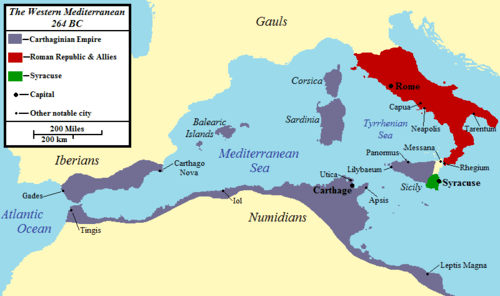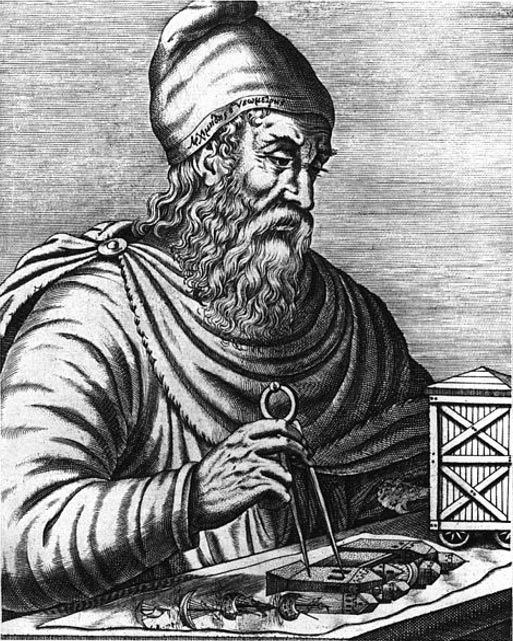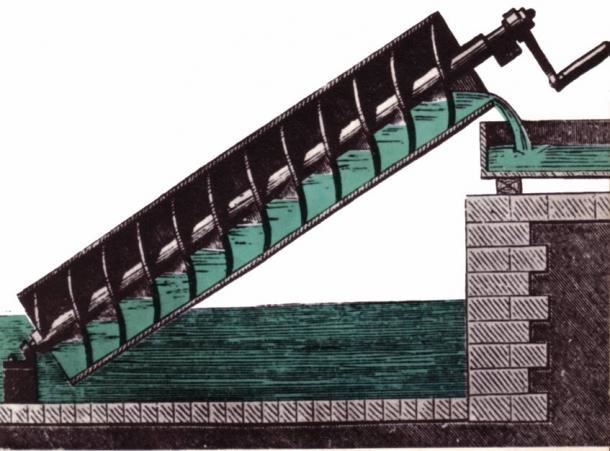 Ancient Greecehttps://www.ancient.eu/syracuse/The sound of zealful screeches flooded the air as armies of boats surrounded the small city state of Syracuse, Sicily. The noise was met with silence as a behemoth-sized object was hurled into the air, unimaginably high, crashing down on ships. This is the sight the Roman Army laid eyes on, when they attempted to capture the city state of Syracuse; they were met with the wrath of Archimedes’ machines (Toomer). Archimedes of Syracuse had been lathered in knowledge growing up. At an adolescent age he was sent to Egypt where he studied with the smartest in the world at the time, former students of Euclid ("Archimedes."). Over the course of his life he derived countless principles and formulas, such as the volume of spheres and cones, a fairly accurate approximation of the number pi, and the foundation of modern day calculus. Archimedes was killed during the second Punic war (Hasan 27). Archimedes was one of the world's greatest heroes, not only for his mathematical achievements, but also for his hard work and advancements in advanced mathematical formulas, and his selflessness when he saved his home city from the Roman army, and invented irrigation systems for developing countries.
Ancient Greecehttps://www.ancient.eu/syracuse/The sound of zealful screeches flooded the air as armies of boats surrounded the small city state of Syracuse, Sicily. The noise was met with silence as a behemoth-sized object was hurled into the air, unimaginably high, crashing down on ships. This is the sight the Roman Army laid eyes on, when they attempted to capture the city state of Syracuse; they were met with the wrath of Archimedes’ machines (Toomer). Archimedes of Syracuse had been lathered in knowledge growing up. At an adolescent age he was sent to Egypt where he studied with the smartest in the world at the time, former students of Euclid ("Archimedes."). Over the course of his life he derived countless principles and formulas, such as the volume of spheres and cones, a fairly accurate approximation of the number pi, and the foundation of modern day calculus. Archimedes was killed during the second Punic war (Hasan 27). Archimedes was one of the world's greatest heroes, not only for his mathematical achievements, but also for his hard work and advancements in advanced mathematical formulas, and his selflessness when he saved his home city from the Roman army, and invented irrigation systems for developing countries.
 Archimedes at Workhttps://www.ancient-origins.net/history-famous-people/archimedes-ancient-greek-genius-ahead-his-time-003690Archimedes was known all around the globe during his time for his hard work and determination; he reflected this through his countless hours spent studying and creating mathematical formulas. Archimedes never let his studies off his mind. Legend has it “[h]e was supposedly bathing when he figured out how to determine if the king's golden crown contained silver, thrilled, he reportedly ran through the streets naked shouting, ‘Eureka!’” (Leslie). Some may claim he was too immersed within his work for his own good, when he ran down the narrow streets of Syracuse screaming. Regardless of how extreme or absurd Archimedes’ actions may seem, he was a dedicated soul. He was captivated by his work constantly, relentlessly working. It just goes to show how serious he was about his work if he was making discoveries while bathing. This determination is what led to his great success, as he was able to discover so many new principles. If math wasn't always on his mind, we may not have the advanced knowledge that we do today: “Archimedes’ mathematical proofs and presentation exhibit great boldness and originality of thought on the one hand and extreme rigor on the other, meeting the highest standards of contemporary geometry” (Toomer). Archimedes founded many mathematical formulas and principles, which we still utilize to date. What makes him a true genius and hero is that his discoveries where up to two thousand years ahead of his time. Archimedes’ rigorous work paid off dearly, and part of our modern understanding and applications of math can credited to his determination.
Archimedes at Workhttps://www.ancient-origins.net/history-famous-people/archimedes-ancient-greek-genius-ahead-his-time-003690Archimedes was known all around the globe during his time for his hard work and determination; he reflected this through his countless hours spent studying and creating mathematical formulas. Archimedes never let his studies off his mind. Legend has it “[h]e was supposedly bathing when he figured out how to determine if the king's golden crown contained silver, thrilled, he reportedly ran through the streets naked shouting, ‘Eureka!’” (Leslie). Some may claim he was too immersed within his work for his own good, when he ran down the narrow streets of Syracuse screaming. Regardless of how extreme or absurd Archimedes’ actions may seem, he was a dedicated soul. He was captivated by his work constantly, relentlessly working. It just goes to show how serious he was about his work if he was making discoveries while bathing. This determination is what led to his great success, as he was able to discover so many new principles. If math wasn't always on his mind, we may not have the advanced knowledge that we do today: “Archimedes’ mathematical proofs and presentation exhibit great boldness and originality of thought on the one hand and extreme rigor on the other, meeting the highest standards of contemporary geometry” (Toomer). Archimedes founded many mathematical formulas and principles, which we still utilize to date. What makes him a true genius and hero is that his discoveries where up to two thousand years ahead of his time. Archimedes’ rigorous work paid off dearly, and part of our modern understanding and applications of math can credited to his determination.
 The Archimedian Screwhttps://www.ancient-origins.net/history-famous-people/archimedes-ancient-greek-genius-ahead-his-time-003690Archimedes was by far the most intelligent of his time; however, he never used his talent and knowledge for money or evil, instead he selflessly devoted it to helping others. During his time, he lived through two Punic wars, and he designed and built many machines to defend his city from Roman invaders: "Probably the best known of Archimedes' inventions were those he devised to help defend his native Syracuse against the ships of the Roman Empire. Greek biographer Plutarch (c. 46-119) wrote that during the long battle, the population of Syracuse 'merely provided the manpower to operate Archimedes' inventions' and relied upon his genius alone" (“Archimedes of Syracuse"). Although Archimedes was a dedicated mathematician, when the time came he set aside his work for the good of his home town, Syracuse. Archimedes devised weapons to defend his town against the Roman army. His city-state was severely outnumbered with barely enough manpower to operate his contraptions, yet with his genius weapons, they were able to fend off the Roman army. Archimedes put aside his own tasks and desires to help his hometown. This is a selfless action because he put the good of the people over fleeing, and he may be the only reason his home town still stood at the end of the day. Not all of Archimedes’ inventions were for war; in fact, the majority of his time was spent on simple mechanical inventions created for the benefit of others: “He performed countless experiments on screws, levers, and pulleys. The water snail (also known as the Archimedean screw) is still used in certain parts of the world to raise and move water” (“Archimedes.”). Archimedes was renowned for his discoveries in geometry. Using this knowledge, he was able to create various geometric figures. These shapes eventually led to the development of other contraptions such as the Archimedean screw. The screw is one of his most significant accomplishments because it provided people in rural and impoverished areas accessibility to clean water. It specifically highlights his selflessness because he put the good of others before his own needs and wants when he created it. To conclude, Archimedes displayed selfless traits like that of a hero, from saving the people of his city to inventing contraptions to help the less fortunate survive.
The Archimedian Screwhttps://www.ancient-origins.net/history-famous-people/archimedes-ancient-greek-genius-ahead-his-time-003690Archimedes was by far the most intelligent of his time; however, he never used his talent and knowledge for money or evil, instead he selflessly devoted it to helping others. During his time, he lived through two Punic wars, and he designed and built many machines to defend his city from Roman invaders: "Probably the best known of Archimedes' inventions were those he devised to help defend his native Syracuse against the ships of the Roman Empire. Greek biographer Plutarch (c. 46-119) wrote that during the long battle, the population of Syracuse 'merely provided the manpower to operate Archimedes' inventions' and relied upon his genius alone" (“Archimedes of Syracuse"). Although Archimedes was a dedicated mathematician, when the time came he set aside his work for the good of his home town, Syracuse. Archimedes devised weapons to defend his town against the Roman army. His city-state was severely outnumbered with barely enough manpower to operate his contraptions, yet with his genius weapons, they were able to fend off the Roman army. Archimedes put aside his own tasks and desires to help his hometown. This is a selfless action because he put the good of the people over fleeing, and he may be the only reason his home town still stood at the end of the day. Not all of Archimedes’ inventions were for war; in fact, the majority of his time was spent on simple mechanical inventions created for the benefit of others: “He performed countless experiments on screws, levers, and pulleys. The water snail (also known as the Archimedean screw) is still used in certain parts of the world to raise and move water” (“Archimedes.”). Archimedes was renowned for his discoveries in geometry. Using this knowledge, he was able to create various geometric figures. These shapes eventually led to the development of other contraptions such as the Archimedean screw. The screw is one of his most significant accomplishments because it provided people in rural and impoverished areas accessibility to clean water. It specifically highlights his selflessness because he put the good of others before his own needs and wants when he created it. To conclude, Archimedes displayed selfless traits like that of a hero, from saving the people of his city to inventing contraptions to help the less fortunate survive.
All in all Archimedes will forever be an inspiration for his persistence and selfless heroic actions. He made multiple advancements, from his mathematical theorems and hard work to his selflessness during the attack on is city. Over the course of his life, “The sophisticated methods he developed for this complicated theoretical problem are today recognized as having been very close to a discovery of the highly useful branch of mathematics called calculus (which had to wait nearly 2,000 years to be invented)” ("Archimedes of Syracuse."). The main takeaways we can get from Archimedes’ legacy are the marvelous results of hard work. Archimedes studied with students of the greatest mathematical geniuses, and their inspiration rubbed off on him. He gave back to the world with his own inspiration when he displayed the incredible reward of hard work and selflessness to the world, using his early derivations of calculus, something that would not be fully invented until thousands of years later. Archimedes’ life is somewhat of a symbol that inspires others and shows that one’s hard work does lead to something, and the power of devoting one’s work to help the needs of others. To conclude I believe Archimedes’ was one of the greatest heroes to have lived because of his inspirational commitment and selfless character. Nowadays the zealful cries we hear are not those of endangered Roman soldiers, but society cheering for everything he has done for this world.
Works Cited
"Archimedes." World of Physics, Gale, 2006. Biography In Context,
https://link.galegroup.com/apps/doc/K2434100009/BIC?u=powa9245&sid=BIC&xid=e3e22f48. Accessed 21 Mar. 2019.
"Archimedes of Syracuse." Math & Mathematicians: The History of Math Discoveries
Around the World, edited by Leonard C. Bruno, UXL, 2008. Biography In Context, https://link.galegroup.com/apps/doc/K1669000003/BIC?u=powa9245&sid=BIC&xid=09c558d7. Accessed 21 Mar.
Hasan, Heather. Archimedes: the Father of Mathematics. Rosen Central, 2006.
Leslie, Mitch. "The first Eureka moment." Science, vol. 305, no. 5688, 2004, p. 1219. Biography
In Context, https://link.galegroup.com/apps/doc/A121764072/BIC?u=powa9245&sid=BIC&xid=697e714f. Accessed 21 Mar. 2019.
Toomer, Gerald J. “Archimedes.” Encyclopædia Britannica, Encyclopædia Britannica,
Inc., 26 Oct. 2018, www.britannica.com/biography/Archimedes.
Page created on 4/22/2019 6:06:29 PM
Last edited 4/22/2019 7:41:03 PM
